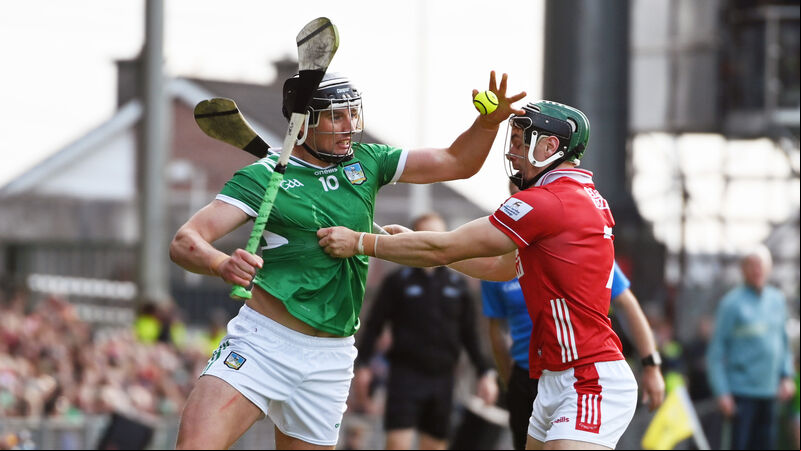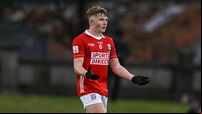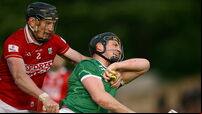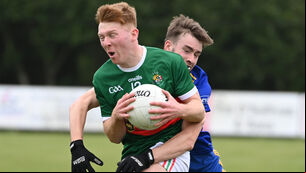Christy O'Connor: Cork most doubted hurlers answered their critics

Mark Coleman tackles Limerick's Gearóid Hegarty during the Munster hurling final at TUS Gaelic Grounds. Picture: Eddie O'Hare
As the Cork crowd bobbed and weaved on an ocean of ecstasy, washing and splashing away so much of the hurt, pain and heartbreak endured since their last Munster title seven years ago, roaring out the lyrics to Gala’s dance classic Shane McGrath described the scene is his Radio One co-commentary as “the biggest nightclub in Europe”.
It seemed to be as the air was shot through with elation for Cork on an eternal night where this latest chapter in Munster hurling’s storied history was written into lore for more than just guts and glory. A first Munster final decided on penalties was just another means of trying to capture a story you couldn’t make up.
The chaos and spine-tingling drama that had preceded penalties nearly granted the ten takers, and both goalkeepers, a dispensation. Every player had emptied themselves to the point where it was Cork who just had the last drop of sweat, blood and ice in their veins left to finally carry them over the line.
It took Cork everything they had, and more, but this performance was also an endorsement of Cork’s conditioning and physical capacity to endure in the furnace of Limerick’s intensity and aggression. Limerick’s tackling was as ferocious as ever. Trying to break free from a gang of Limerick tacklers was like trying to break out of a UFC cage, but Cork are able to survive that brutality now when it had worn them down so often in the past.
The most salient example was the contribution Cork got from players off the bench who Limerick have swallowed whole so often in the past. From a combined nine possessions in extra-time, Shane Kingston and Conor Lehane scored 0-5 and assisted two more points, while Robbie O’Flynn had two assists.
In an evening of suffocating intensity, extreme pressure and intoxicating drama, there was bound to be a constantly twisting narrative, with mistakes and errant shooting, especially with a tricky breeze.
Yet Cork were more clinical and efficient when it mattered most, nailing eight of 11 chances in extra time, with Limerick bagging eight from 15.
Cork only won six of their 14 long puckouts in extra-time but Limerick only secured two of their long restarts in the same period. Limerick won seven of Cork’s 11 long puckouts in the first half – and yet Cork still mined 1-2 from those four puckouts they won.
It was that kind of an afternoon for Cork where they just found a way, or managed to halt Limerick from putting them away.
Limerick will have regrets over their shooting in extra time, but Cork had eight more shots in normal time and had four more in total (53-49).
In the end, everything came down to the finest margins. Cork’s shooting efficiency was 58%, Limerick’s coming in at 59 %. Cork’s conversion rate from play was 58% compared to Limerick’s 54%. Cork’s conversion rate from placed balls was only 60%, but Darragh Fitzgibbon’s last gasp 65 was an apt metaphor for his, and Cork’s, bravery and mental fortitude.
The intensity was so savage that there was a colossal 95 turnovers. Yet it’s a huge tribute to Cork that they turned over less ball than Limerick (46-49). Cork shipped 1-14 off turnovers, but they mined 0-14 from the same source.
Cork set the tone from the word go and just refused to take a backward step all evening. In the opening minutes, Ciarán Joyce turned over Aaron Gillane, while Adam English was hustled out of possession too as both were in goalscoring positions. Seven of Cork’s first eight points were sourced from turnovers.
Cork turned over the ball 29 times in their attacking third. And yet, Limerick had the same struggles, turning the ball over 28 times in their attacking third.
Cork found it difficult to make the ball stick in their full-forward line all evening. Brian Hayes had to wait until the 24th minute for his first possession but the first ball he snapped he turned and went for goal, which was saved by Nickie Quaid.
Hayes only scored one point but his physical presence was still critical all evening.
After only gaining his first possession in the 15th minute, Barrett finished the first half with 1-3 from five shots, and an assist.
Seamus Harnedy was warrior-like all evening; from 15 possessions, Harnedy scored 0-2 while he was fouled for three frees and had three assists.
Patrick Horgan had had better shooting days when nailing seven points from 13 shots (from play and frees) but players everywhere made key impacts at various stages. Diarmuid Healy was brilliant in the first quarter, when scoring 0-2 and assisting another point.

Darragh Fitzgibbon and Mark Coleman were excellent. So was Damien Cahalane. Similar to Lehane and Kingston, Cahalane’s evening encapsulated this team’s journey, and how hard they have consistently had to try and overcome the immense challenges they’ve faced.
When Shane O’Brien scored 1-1 and assisted another point from his first three possessions after coming on, Cahalane was switched onto O’Brien and coped well. And yet, how much heat and criticism would have been showered down on Cahalane’s head if the last free he conceded on O’Brien, which was converted by Aaron Gillane, had been the winning score?
Cork and Cahalane were just glad it wasn’t. Like they had all evening, Cork just found a way.







 App?
App?







